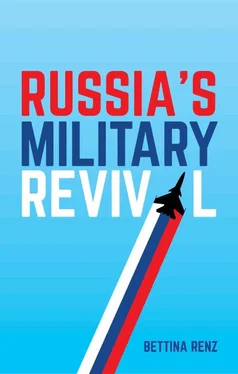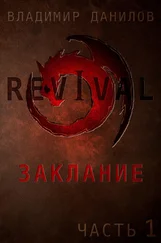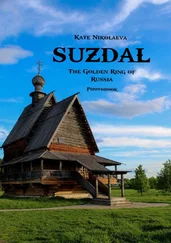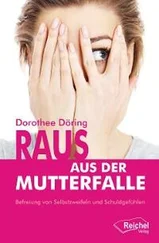The demonstration of Russia’s new military prowess in both Ukraine and in Syria has led to fears that the previously superior militaries of NATO and of the US were in real danger of being overtaken, with severe repercussions for security in Europe and beyond. As Karl Nerenieks, a retired Major General of the Swedish Armed Forces, remarked in 2014, Russia’s armed forces ‘regained their capability to mount large conventional military operations. They are, I would say, some years ahead of us if we started to train for the same thing today’ (House of Commons Defence Committee 2014a). As Blank asserted, Russia’s military revival was being watched closely by the US Strategic Command, because of the belief that ‘within five years Russia could run multiple Ukraine-sized operations in Europe’. Blank (2015) also noted that, if Russian procurement plans were carried through to 2025, ‘this force would have parity with the US and NATO in conventional and nuclear dimensions of high-tech warfare’.
The way in which Crimea had been taken raised concerns that innovations in Russian strategic thought meant that the country had developed a new ‘hybrid’ approach to warfare, which the West already was unable to stand up against. To quote Chuck Hagel again, Moscow was developing ‘capabilities that appear designed to counter traditional US military advantages’ (2014b). This was also noted by Blank (2015): Moscow ‘now seems to favour an approach based on hybrid or multidimensional warfare, similar to the Chinese concept of “unrestricted war”, embracing simultaneous employment of multiple instruments of war, including non-military means where information warfare, such as mass political manipulation, is a major capability’. Michael Gordon, writing about the Crimea operation for the New York Times , described a military ‘skilfully employing 21st century tactics that combine cyberwarfare, an energetic information campaign and the use of highly trained special operation troops to seize the initiative from the West’. This, he believed, had ‘implications for the security of Moldova, Georgia, Central Asian nations and even the Central Europe nations that are members of NATO’ (Gordon 2014). As a UK House of Commons Defence Committee report asserted, the ‘new and less conventional military techniques’ Russia had developed ‘represent the most immediate threat to its NATO neighbours and other NATO Member States’ (House of Commons Defence Committee 2014b).
Since the events in spring 2014, it has been widely accepted that improvements to the West’s defence posture and planning have become vital. In particular, European states have to increase their defence spending, which had been affected by significant cuts since the end of the Cold War. As the New York Times noted, this had rendered ‘NATO less formidable as deterrent to Russia’ (Cooper and Erlanger 2014). As then-NATO Secretary General Rasmussen stated in March 2014, ‘developments in Ukraine are a stark reminder that security in Europe cannot be taken for granted… That is why I will continue to remind European nations that they need to step up politically and militarily. To hold the line on defence cuts. To increase their defence spending’. At a NATO summit held in early autumn in 2014, alliance members pledged to freeze cuts and, where necessary, to increase spending to two per cent of their respective GDPs within the next decade. By 2016 the implementation of this pledge was well under way (Jones 2016). European states outside of the NATO alliance, including Finland and Sweden, have also increased their military budgets in view of the developments in Moscow (Tiessalo 2015; Rathi 2016).
Words of warning about the dangers of a militarily resurgent Russia have resulted in various actions intended to secure Europe. NATO has stepped up its force posture in Central and Eastern Europe, and especially in the Baltic States. The alliance has also held a number of military exercises to demonstrate resolve and unity, and to reassure those member states in the region that are particularly worried about the potential for aggressive Russian action. Whilst remaining outside of NATO, Finland and Sweden have stepped up cooperation with the alliance and both have sought defence cooperation agreements with the US (Borger 2016). Moreover, Nordic countries, including Norway, Denmark and Iceland, have increased their own military cooperation to enhance preparedness for any hostile Russian act in the Baltic region (Agence France Press 2015). There is a feeling in the West that the Kremlin’s actions since 2014 have left no option but to take an uncompromisingly tough stance and to bolster military postures and defences in order to deter an aggressive Russia. As the former chief of staff of the British armed forces, Richard Dannat, noted, ‘with a resurgent Russia this is a poor moment for the US-led West to be weak in resolve and muscle’. Sanctions and diplomacy were insufficient as a response to Moscow’s actions, in his eyes, because Putin ‘will look beyond those things to see where the real check on his actions might come from’ (quoted in Cooper and Erlanger 2014). This was echoed by NATO Supreme Allied Commander Europe (SACEUR) General Curtis Scaparrotti, who put forward an unambiguous warning to the alliance in May 2016: ‘a resurgent Russia [is] striving to project itself as a world power… To address these challenges, we must continue to maintain and enhance our levels of readiness and our agility in the spirit of being able to fight tonight if deterrence fails’ (quoted in Bodner 2016).
This book argues that reactions of this nature to the annexation of Crimea and to Moscow’s involvement in the war in Syria are problematic, because they are based on three misguided assumptions regarding the timing, purpose and scope of Russia’s military revival: first, the view that the desire for a powerful military and its use signals a ‘paradigm shift’ in the Kremlin’s outlook; second, the idea that the reason the military revival is pursued necessarily is to enable an expansionist and aggressive foreign policy; and third, the notion that Russian military capabilities now rival those of the West. These assumptions are misguided, because they fail to take into account the historical and international context of the military revival, which did not occur in a vacuum. The purpose of the book is to provide this context.
Taking these assumptions as a starting point, the book’s analysis revolves around three major arguments. The first argument purports that the Kremlin’s most recent efforts to strengthen the armed forces is not the result of a ‘paradigm shift’ in views on the utility of military power. This is because the decision to modernize the armed forces did not come out of nowhere or occur in a vacuum. As the chapters of the book will show, rather than representing a break from the past, recent developments are the result of a complex confluence of historical, political and economic factors, many of which have been long in the making. Second, the modernization of Russia’s military in recent years was not determined by the desire to pursue expansionist or unilaterally aggressive policies in a bid for domination. The assumption that this is the case reflects a one-sided understanding of why states, including Russia, view a powerful military as an important asset. Military power is a flexible tool of statecraft and its utility is not limited to the fighting of wars and defeating of opponents. This needs to be borne in mind when the Kremlin’s reasons for strengthening its armed forces are assessed. As such, recent efforts to reform the country’s armed forces can only be understood within the context of the variety of functions the Russian armed forces have fulfilled throughout history. Third and finally, the book argues that the military revival has not resulted in capabilities that have substantially altered the power balance in Europe or even beyond. This is because a state’s military power is never absolute, but always relative to that of others. It is beyond doubt that Russia’s military capabilities today are much improved compared to what they were in the 1990s. In terms of military planning, too, there have been marked improvements in the ability of Russian strategists to fine-tune military tactics to suit the circumstances of operations of various intensity. However, these improvements do not mean that the country’s capabilities now rival those of the West, will guarantee victory in all cases, or even that they have created substantially new opportunities for the achievement of objectives that were not achievable before.
Читать дальше












